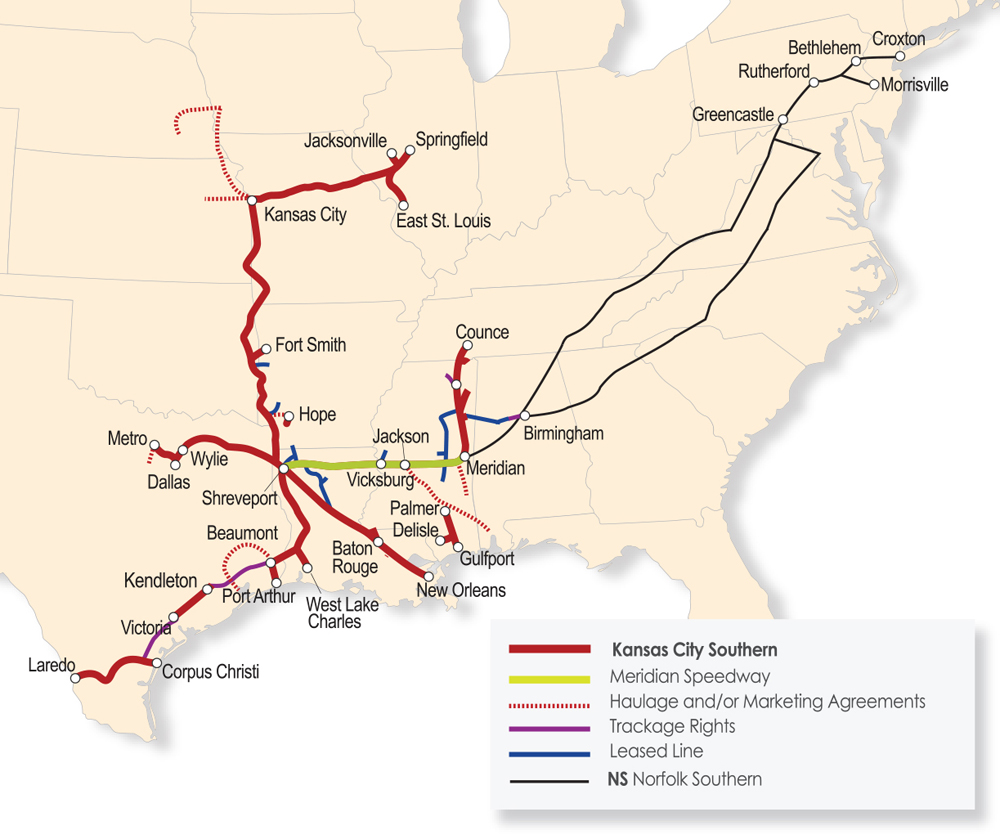
WASHINGTON — Canadian Pacific Kansas City has told federal regulators that Norfolk Southern and Union Pacific complaints about its train-length restrictions and handling of their intermodal trains on the Meridian Speedway have no merit.
On Sept. 30, the eve of the federal government shutdown, NS and UP wrote separate letters to the Surface Transportation Board, with NS alleging that a deterioration in service on the Meridian Speedway joint venture had prompted intermodal customers to divert freight to the highway. [See “Norfolk Southern claims Meridian Speedway service woes push freight to trucks,” Trains.com, Oct. 3, 2025]
NS asked regulators to enforce CPKC’s promise, made while the CP-KCS merger was under regulatory review, that it would maintain service levels on the Speedway, the 302-mile corridor that stretches from Meridian, Miss., to Shreveport, La., and is a shortcut for traffic moving between the West Coast and the Southeast.
UP, meanwhile, asked the STB for an investigation to determine whether CPKC was living up to its merger-related service promises.
CPKC told the STB, in a Nov. 13 filing, that the NS and UP complaints are inaccurate and are not subject to board oversight.
“There are only two kernels of truth in NS’s and UP’s assertions. One is that CPKC did experience a brief period in the summer of 2025 when service on the Meridian Speedway was affected by CPKC’s Day-N IT cut-over. The Day N service issues have long-since been resolved, with transit times on the Speedway for NS’s haulage trains now better than already-good pre-merger levels,” CPKC wrote.
CPKC experienced congestion in May, June, and July in former KCS territory in the U.S. after a troubled May 3 computer system cutover.
“The other kernel is that CPKC did decide to enforce a uniform 8,500-foot length limit for trains on the Speedway corresponding to the design length of the sidings there, as contemplated in the applicable agreements between CPKC and NS. Other than that, UP’s assertions are both insubstantial and already out-of-date,” CPKC told the board. “CPKC and NS have agreed that CPKC will operate one eastbound train of up to 11,000 feet until crews are available to support an additional daily train pair (planned to start Nov. 17), and in exchange NS will partially compensate CPKC for delay costs the over-length train inflicts on other traffic on the Speedway.”
CPKC in August 2025 reinstated an 8,500-foot train length restriction on the Speedway, a move that affected only the eastbound interline UP-NS intermodal train, which is symboled Z-LAAI on UP and 28J on NS. CPKC said the train was delaying all other traffic on the Speedway.
“The Speedway has a passing siding every 15 miles, but there is a siding that can fit an 11,000-foot train only every 100 miles on average, with gaps between the longer sidings (from west to east) of 48.5 miles, 38 miles, 109 miles, and 95 miles,” CPKC told the board. “This configuration means that when UP delivers an eastbound train longer than 8,500 feet at Shreveport, the movement of that train across the Speedway inevitably causes operational disruption by forcing all opposing traffic to take sidings.”
CPKC also noted that NS, in comments on the CP-KCS merger in 2022, expressed concern that CPKC would operate trains longer than siding length and delay other traffic on the line.
“Contrary to the assertions of UP and NS, they are the parties seeking to degrade service by insisting on running over-length trains that largely force all other Speedway trains to clear a path for them, rather than building shorter trains that fit the sidings on the Meridian Speedway,” CPKC wrote.
CPKC: Trains meet transit time commitments
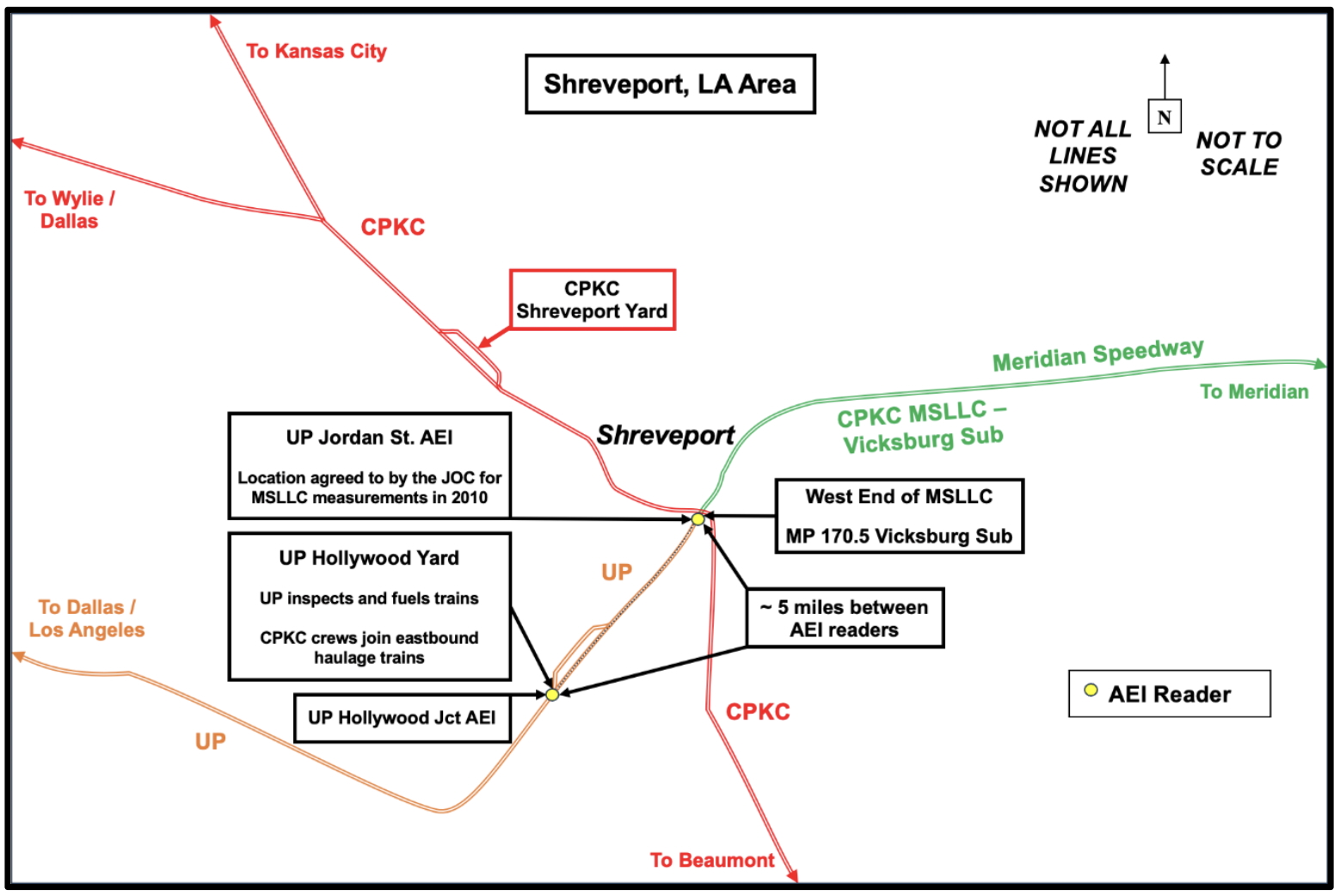

CPKC also disputed NS data that showed the UP-NS stack trains were not meeting a 13-hour guaranteed transit time across the Speedway.
“The data NS presents in its letter do not reflect transit times on the Meridian Speedway. Instead, those data reflect the time between a location on UP’s track near Shreveport that is beyond the west end of the Meridian Speedway and a location on NS’ track in Meridian, Miss., that is beyond the east end of the Meridian Speedway,” CPKC wrote. “As a result, the transit times that NS is reporting capture its own delays at Meridian and delays that occur on UP trackage in Shreveport over which CPKC has no control.”
CPKC says the average transit time for all of the NS haulage trains since May 2023 was 10.3 hours, compared to 11.1 hours dating back to January 2018 when KCS controlled the Speedway.
CPKC also said that since 2018 more than 40% of UP-NS haulage trains were not subject to the transit time guarantee because they didn’t meet operational standards outlined in the Meridian Speedway contract. “More than three-quarters of those disqualifications were on account of the train being underpowered,” CPKC said.
“It seems that NS and UP are choosing to prioritize locomotive productivity metrics over the fluidity of the Meridian Speedway for the benefit of all of the customers (NS’s and CPKC’s alike) that expect reliable service there,” CPKC wrote.
NS claims faltering service levels on the Meridian Speedway caused customers to divert freight to the highway.
But CPKC says the volume decline is related to other factors, including tariffs, oodles of truck capacity, a broad freight downturn, and UP’s decision to shift domestic Northern California intermodal traffic and international business from the ports of Los Angeles and Long Beach to the Memphis gateway.
The UP-NS volume began to decline in early 2022, a year before CP acquired control of KCS, and when transit time performance was strong, CPKC said.
“The bottom line is clear: NS haulage traffic is not suffering from the level of service that CPKC provides, but rather from macroeconomic factors and NS’s and UP’s own business decisions,” the railway said.
CPKC claims that NS and UP are trying to turn the train length dispute into a CPKC merger-condition enforcement matter in order to show that interline agreements don’t work. UP, as part of its proposed acquisition of NS, has argued that mergers are the only effective way to provide single-line service.
CPKC said that the Meridian Speedway joint venture, which dates to a 2006 deal between KCS and NS, has proven successful over the long run. But such arrangements cannot work if “one party no longer desires to pursue the cooperation that previously made the venture successful,” CPKC said.
— To report news or errors, contact trainsnewswire@firecrown.com.





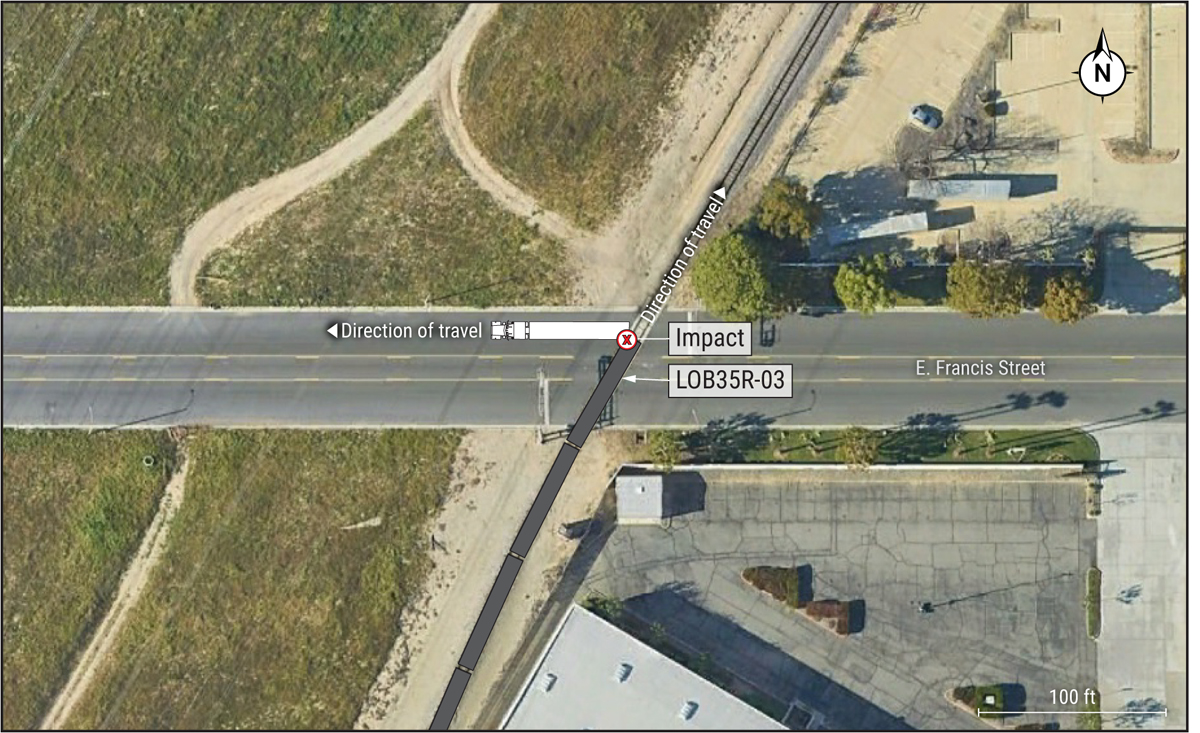
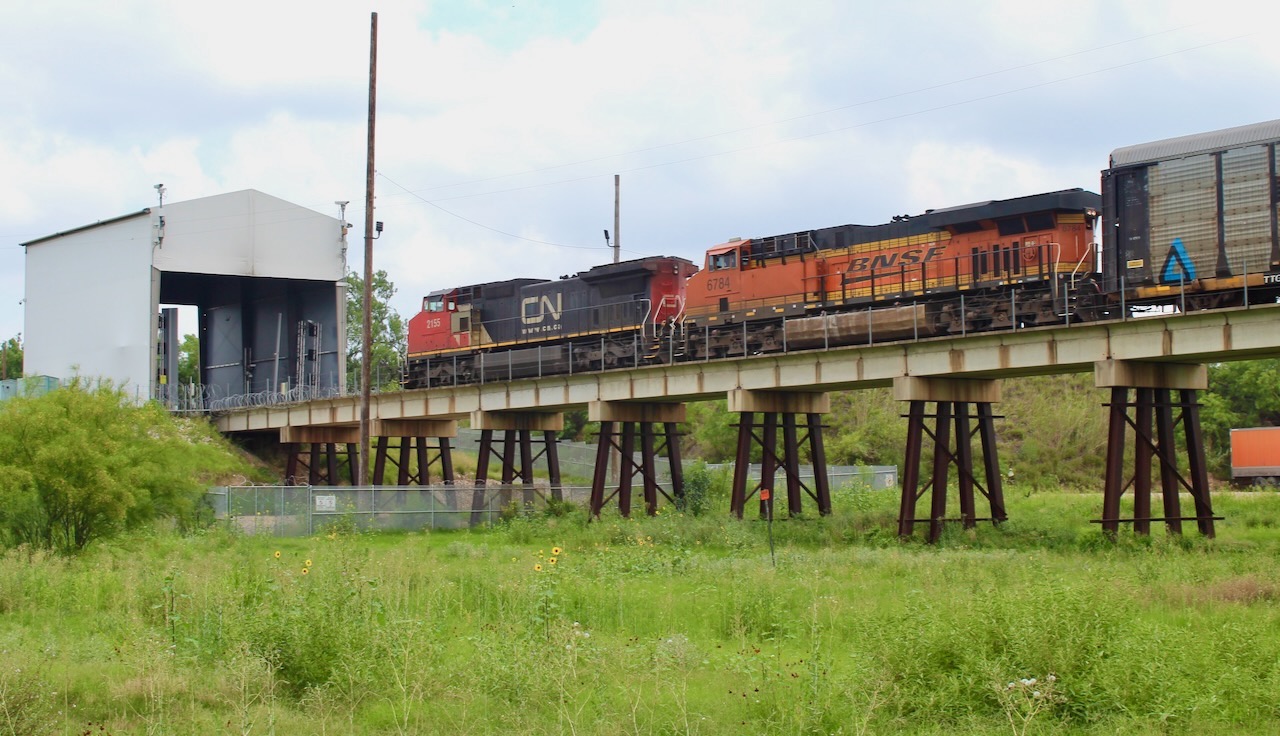
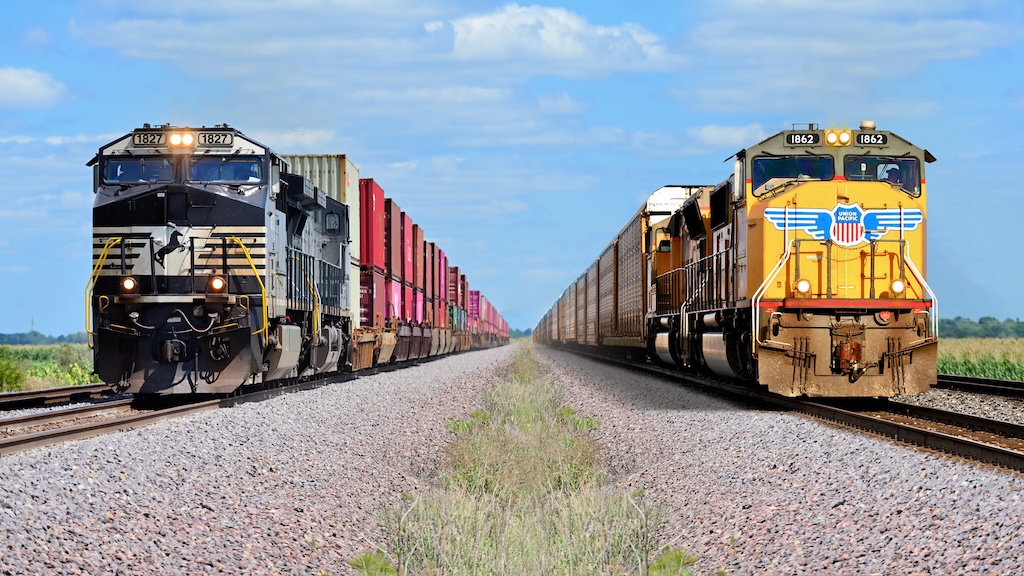
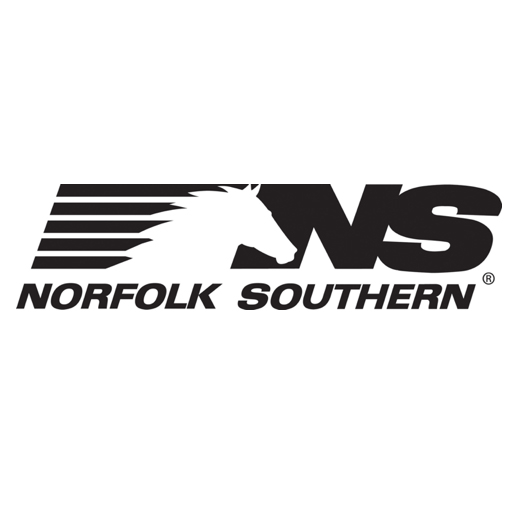
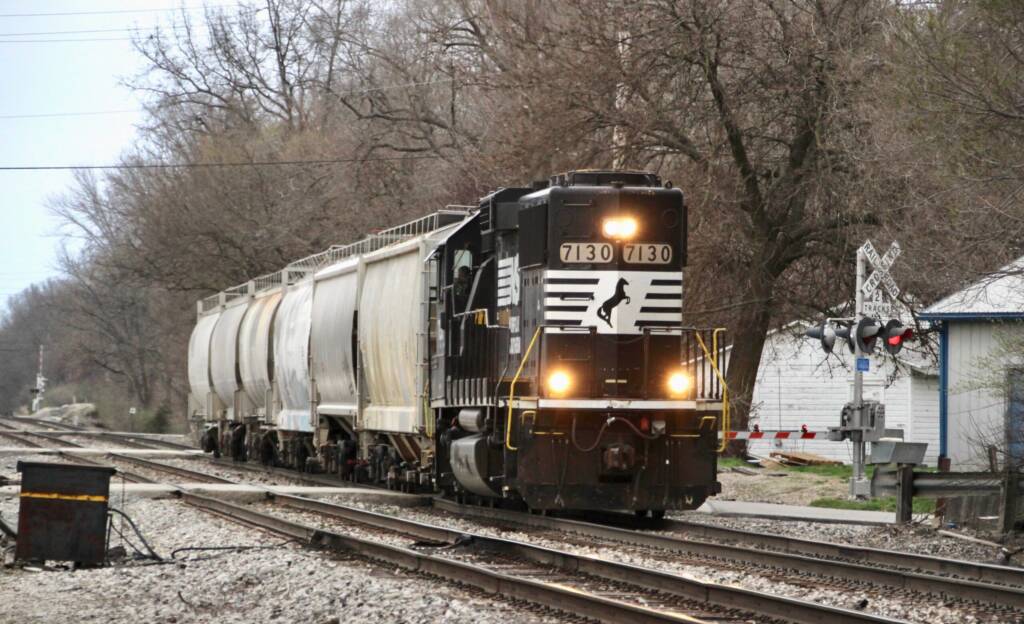





It is no more a “speedway” than Chi-Aurora a “racetrack.”
CPKC isn’t alone on getting blood out of a turnip.
Great article summarizing what is going on! It would be interesting if you called up a shipper who has a GPS enabled container/trailer fleet for their take on everything. Maybe CR England or KLLM? While the segment speed of 32 mph seems good, once you factor in refueling and other delays outside the speedway segment they could probably tell you the story of where trains are really sitting.
Calling a 40 mph, single track railroad with few 1950s era sidings a “Speedway” is a joke. I guess all class 1 parties are waiting for taxpayers to build a 70 mph line with 15,000 foot sidings. Look for a leg of the Amtrak Crescent get hundreds of millions to do the CapEx that CPKC refuses.
Well it s a given that CPkc will not build any longer sidings, CP’s goal in practice has always been to get someone else to improve the rails they run on like Amtrak… Never spend a dime if you can get someone else to spend it in your behalf…
GREGG — You just described some Amtrak routes.
The KCS Meridian-Shreveport line hasn’t been a 40 mph railroad for nearly 30 years. I was a KCS train dispatcher when the railroad purchased the Mid South line in 1995 in a joint financial agreement with Norfolk Southern. Soon welded rail and CTC were installed bringing the speed limit up to 60 mph.